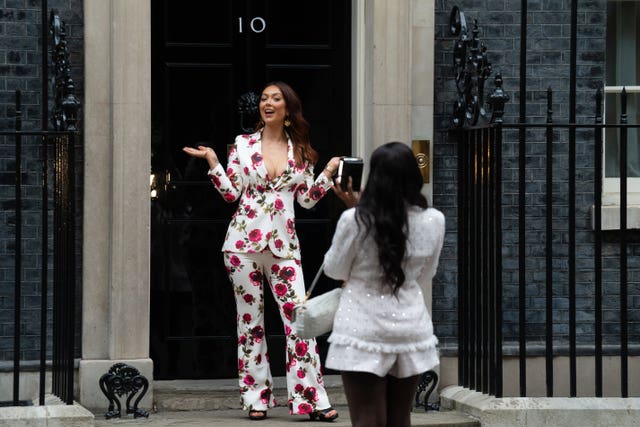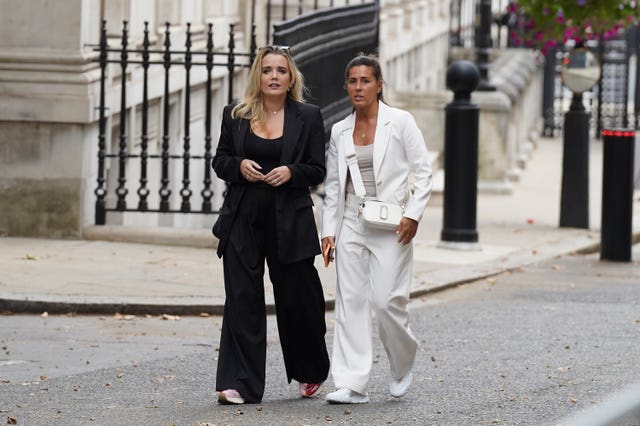Ministers deny concessions as Online Safety Bill returns to Commons
Technology Secretary Michelle Donelan insisted that nothing had changed in the long-awaited legislation.

Ministers have denied that concessions were made to social media companies amid a row about end-to-end encryption, as the Online Safety Bill edged closer to the statute book.
Technology Secretary Michelle Donelan insisted that nothing had changed in the long-awaited legislation, after privacy campaigners earlier this month claimed a victory following widespread reports of a shift in the Government stance on encryption.
End-to-end encryption is a security measure that protects data and communications by scrambling them, meaning only the sender and recipient are able to read the data.

It is widely used to safeguard sensitive information, with Signal and fellow messaging service WhatsApp among its high-profile users.
Tech firms had said a provision in the Online Safety Bill would give the regulator the power to try to force the release of private messages on end-to-end encrypted communication services.
WhatsApp and other messaging services had warned they would look at pulling out of the UK rather than compromise people’s ability to communicate securely.
But a statement by digital minister Lord Parkinson in the Lords in September was seen by some as confirmation of the Government stepping back and amending its approach.
Ms Donelan insisted on Tuesday that nothing had changed in the Bill, which she said contained a “safety net” that “may never have to be used”.
“There has been a lot of confusion over what this is all about,” she told the PA news agency.
“The Bill works in a way that strips out illegal content, forces social media companies to adhere to their own terms and conditions and also empowers adults. When it comes to children, we’re saying they’ve got to enforce – making sure that no illegal content is there and also that legal but harmful content is not there either for children,” she said.
“In terms of end-to-end encryption, when a platform about to encrypt or already has encrypted – if there were concerns then raised with the regulator that there was paedophilia or child abuse on there, then the regulator would have a conversation with that platform, see what mitigations they could put in place to adhere to the legislation.
“If none of that worked, we need a safety net built into this piece of legislation – and the safety net works by the regulator saying you now need to invest in technology that will allow you to maintain the privacy element of encryption, protect encryption, but also enable us to have access and find these criminals, these heinous individuals, these paedophiles, these stains on society.
“It may never have to be used. But we think it is important that we put that safety net in legislation.”

The Bill returned to the Commons for its final stages on Tuesday, with MPs considering new amendments.
Technology minister Paul Scully also stressed that the position of the Government had not changed, telling MPs that there was “no intention by the Government to weaken the encryption technology”.
He added: “Now there’s been coverage in the media of how the Bill relates to encryption and has not often been accurate. I’d like to take the opportunity to set the record straight: our stance on tackling child sexual abuse online remains the same.”
But former minister Dame Caroline Dinenage, who chairs the Culture, Media and Sport Committee, said she was still a “little bit confused” about the Government’s stance.
“It sounds like the minister has acknowledged that there is no sufficiently accurate and privacy-preserving technology currently in existence and that the last resort power would only come into effect once the technology was there,” she said.
The return of the Bill to the Commons came as campaigners, sport stars and TV figures joined Ms Donelan in Downing Street to back the proposed legislation.
TV personality Georgia Harrison, whose ex-partner Stephen Bear was jailed earlier this year for posting intimate footage of her on his OnlyFans account, was among those joining the Technology Secretary in Number 10.
Others attending included Georgia Kousoulou, a former star of ITV’s The Only Way Is Essex (Towie) and ex-England international footballer Fara Williams.
Ms Kousoulou, who said she had been a victim of severe trolling, told PA that waiting for the legislation had been frustrating but that she was hopeful it would make a difference to online safety.
“I knew it was going to happen. It is a movement and things do take time. Things are moving on, it is now 2023. And I am just so glad that everyone is on board with these and change is going to happen,” she said.
Speaking after the meeting, Ms Williams said that the Bill would be a “start”.
“We’re not going to see a change straight away. Like with everything with safety, we have to implement things and it’s a process.”
Other attendees included presenter and author Emily Clarkson and former Love Island contestant Sharon Gaffka.
Ms Gaffka said: “I definitely believe it is long overdue. I can understand and sympathise with the Government that they’ve had political obstacles and legal obstacles to overcome to make the Bill as strong as it is.
“I don’t think change will happen overnight but I think it is a step in the right direction.”
The Bill will now return to the Lords.





